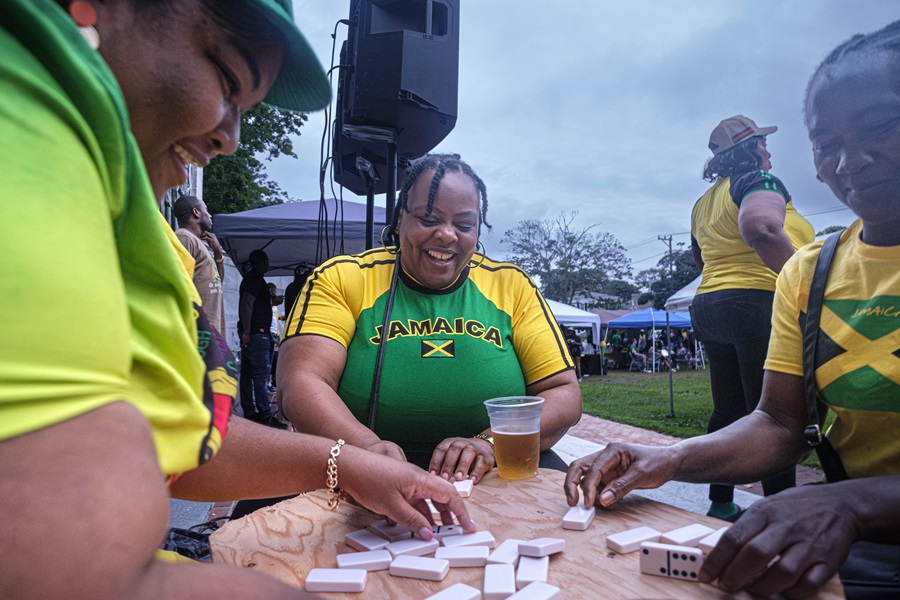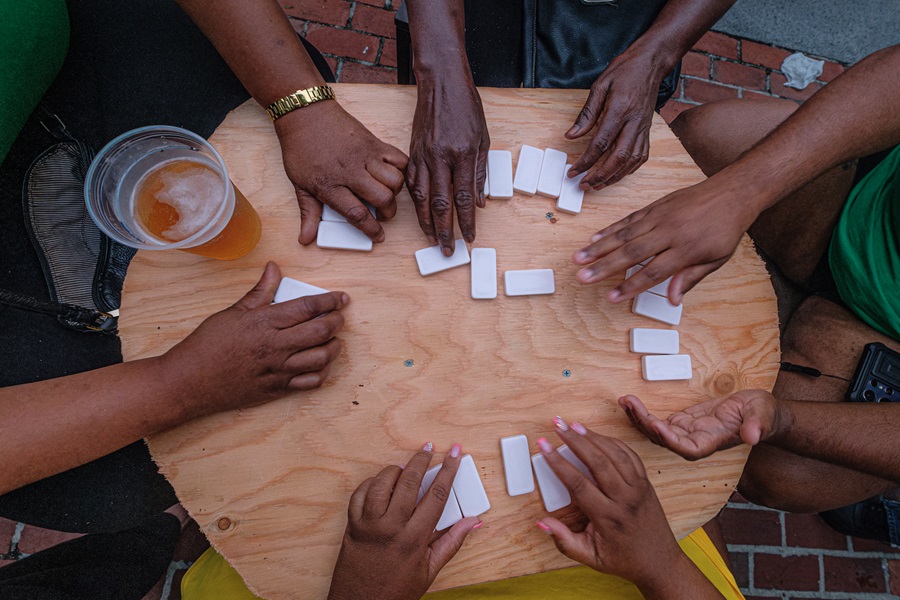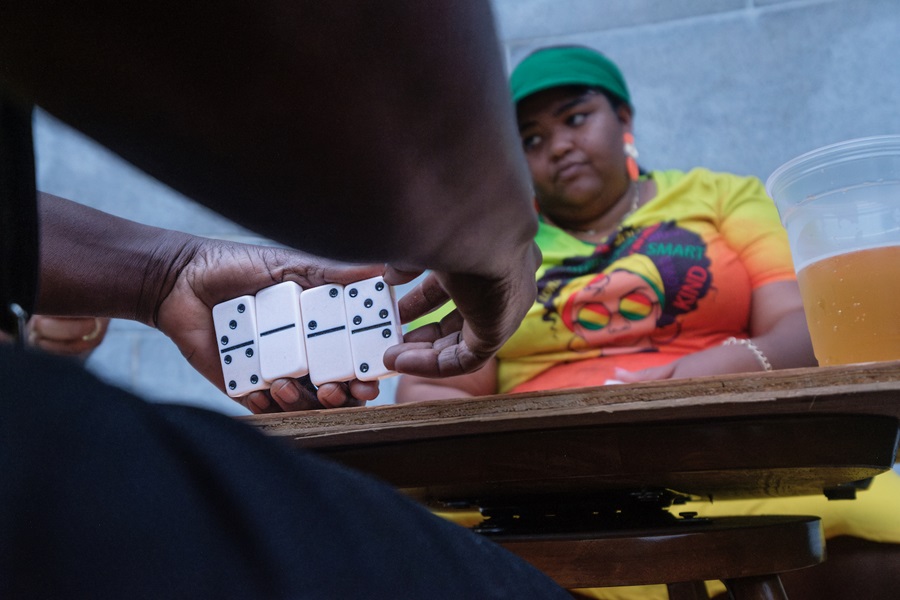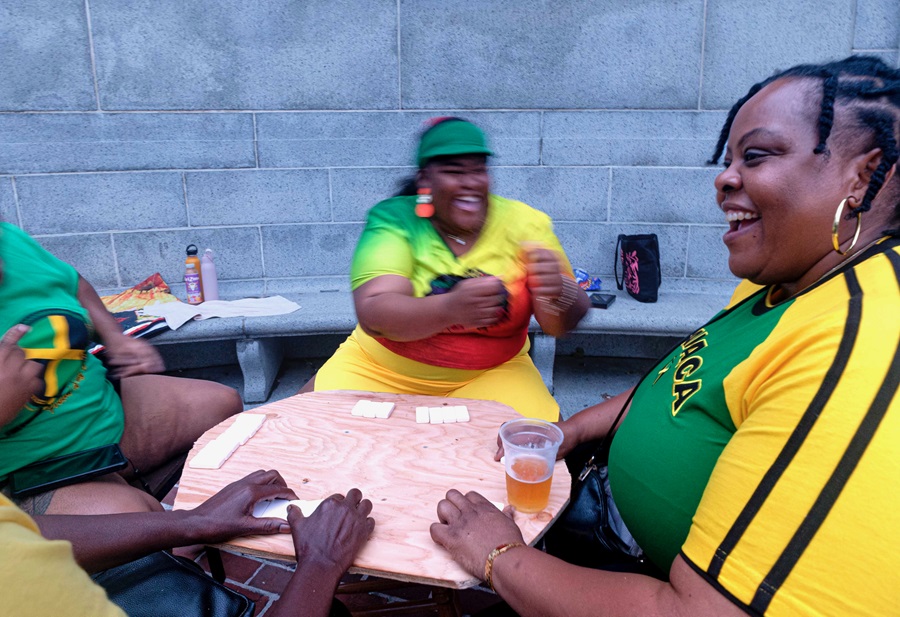PROVINCETOWN — Jamaica’s Independence Day on Aug. 6 was celebrated in fits and starts here, as intermittent rainstorms moved across the sky and work commitments drew people away from the gathering too soon after they’d settled in for a serving of goat curry or jerk chicken from the simmering pots of local vendors.
But by 8 p.m., the party had started in earnest, with reggae beats spun by a collection of DJs growing louder and floating out from a booth set up on the lawn on Bradford Street that everyone calls Bas-Relief Park.
Dozens of members of the Jamaican community and their friends fanned out across the granite and grass, laughing, dancing, eating, and drinking together. Somewhere, a bubble machine churned out soapy orbs as kids piled in and out of a bouncy castle.

In the bas-relief alcove, a dominoes game was underway: four women, Latoya Brown, Kereen Cooper, Patricia Gayle, and Tameka Clarke, all dressed in shades of the yellow and green of their homeland’s flag, were arrayed around a table next to the DJ booth, singing along as they played. Their game: block dominoes. (There are other domino games, with names like “the draw game,” “chickenfoot,” and “matador,” according to a Wikipedia list referring to The New Complete Hoyle.)
People don’t have to already be friends to sit down and play together, said Brown, who lives in South Yarmouth and came down for the celebration. The game doesn’t call for introductions, she said: “The domino will just be there. A table will be there. I’ll go to the table, and someone will come and say, ‘Hey, you playing?’ Then we’ll start playing.”

Dominoes is played throughout the Caribbean and its diasporic communities. “People play it at their homes,” said Lorenzo Hume. “They might play it at a corner shop. They play it in domino clubs, at bars, at domino tournaments, at picnics. There are people who gamble.” Hume is visiting the Outer Cape from Sherwood Forest in Portland Parish, Jamaica. His brother, Kevin Hume, a local filmmaker who also runs a gardening business, helped organize the Aug. 6 celebration.
For Jamaicans, from novice players to experts, it is often more than just a game. Jamaica’s Minister of Sports, Youth, and Culture Olivia Grange declared dominoes a national sport in 2010. There have even been efforts by domino associations in Jamaica to introduce it to the Olympics. Mostly, though, it is an activity that links one generation to the next and creates community.
“It comes from our roots, meaning it was passed down by our foreparents to us,” said Brown.
For Riko Belafonte, who grew up in St. Andrew, Jamaica and now works summer seasons at Local 186 in Provincetown, playing dominoes was always a way to pass the time with family.
He learned the game from his mom, Lorna. When he is home, they play around a big table with his dad, Peter, and his sister, Shanique.
“We play on the weekends, when we’re finished eating and just hanging out,” said Belafonte. “We match the dominoes together and whoever finishes first wins.”

The cultural origins of the game are hazy, but Hume and Brown agree that dominoes, which some trace back to ancient Egypt and 12th-century China, came to the Caribbean from somewhere else. Brown rattles off the unanswered questions: “Was it from slavery? Was it recreation for the slaves? Was it introduced by the slave master? Or is it a tradition that came from Africa to the Americas?”
Brown says that dominoes is played not only at celebrations but also during periods of mourning.
“Older folks would play this game if there was a gathering just like this, or even if there is what we call a Dead Yard,” said Brown. A Dead Yard, also known as Nine Night, takes place nine days after someone has died. As happens at a wake, friends and family gather at the house of the deceased to celebrate a life, share a meal of fried fish, bread, and rum. And to play dominoes.
At the Jamaican Independence Day celebration, the setup for the game went something like this: The women shuffled the 28 domino “cards” — which others might call tiles, bones, men, or pieces — by turning them face down on the plywood surface before dividing them by four. Each woman drew seven cards and held them close to her chest, considering her respective hand.
“You don’t want your hand to be revealed,” said Brown.

The domino cards are named for the number of dots on each half. For example, a card with five dots on one side and four on the other is referred to as a five-four.
The woman with a double-six laid it down as the opening move to start the game. Then the play moved to her left, with Cooper laying down a card with six dots to match.
To Cooper’s left, Gayle and Clarke then each laid down cards with a count that matched the open end of a card already on the table. If one of them could not make a match, she skipped her turn. The aim is to lay all one’s cards down first.
Their game was not about finding the perfect play or keeping score, but some strategy was needed to determine which of the seven cards to play when and communicate, or as Hume described it, “code,” what they did and did not have.
“It requires you to use your mind and read what your opponent is planning on playing as their next move while you anticipate your move just the same,” said Brown.
The women continued this way for close to an hour, reshuffling the cards, celebrating small wins, and teasing each other before chairs and players were exchanged. A newcomer traded places with Gayle, who continued observing for a while. All around, in the fading August light, partygoers grooved in time to the beat, while these women kept up tradition.



